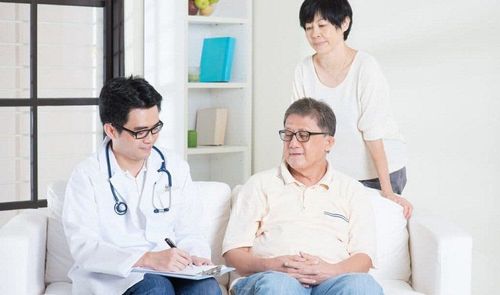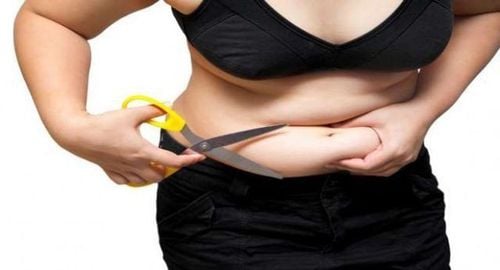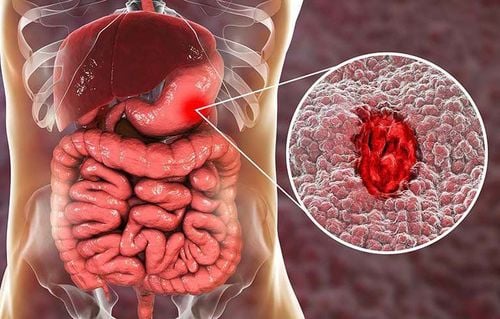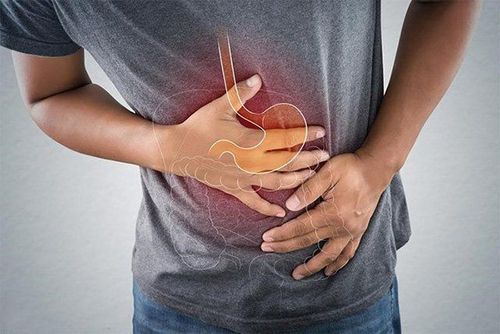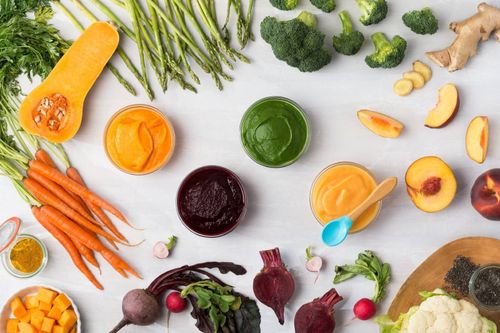This is an automatically translated article.
After gastric bypass surgery, patients need to adhere to a strict diet to recover soon and reduce the risk of complications. With the question of what to eat after gastric bypass surgery, the content below will help answer in detail.1. Some common problems after gastric bypass surgery and how to handle
Gastrectomy is the removal of part or all of the stomach. The stomach is smaller, holding less food and fluid than before. Thus, food and gastric juices will go to the small intestine faster, which can cause a number of disorders, affecting the patient's quality of life. Some problems that often occur in patients after gastric bypass surgery are as follows::Feeling full sooner: The patient should eat several small meals a day. Every day should eat 6-8 main meals, eat nutritious snacks between meals and drink water at least 30 minutes before or after meals; Diarrhea: Patients should drink plenty of fluids between meals. If you have diarrhea 15-30 minutes after eating, you may have early Dumping syndrome. If diarrhea persists, it is necessary to re-evaluate the diet, find the cause and take measures to treat; Weight loss: Patients should eat many nutritious, protein-rich and fat-rich snacks between meals. At the same time, it is recommended to monitor your weight weekly, you can consult your doctor if the weight continues to decrease; Dumping syndrome: This is a condition in which food passes from the stomach to the small intestine too quickly. Common symptoms include nervousness, fatigue, sweating, nausea and vomiting, intestinal cramps or diarrhea. Symptoms that occur about 30 minutes after eating are called early Dumping syndrome; occurs 1 to 4 hours after eating is called late dumping syndrome. Accordingly, the patient needs to be treated for Dumping syndrome as prescribed by the doctor; Gastro-oesophageal reflux: Because the stomach's ability to hold food is reduced, after eating, the patient may have food reflux. Therefore, it is recommended to divide meals during the day, drink water about 30 - 60 minutes after meals, sit or walk gently after eating for about 15 - 30 minutes. At the same time, patients should avoid spicy, spicy, acidic foods, caffeine-containing beverages, alcohol, carbonated water or hot foods;
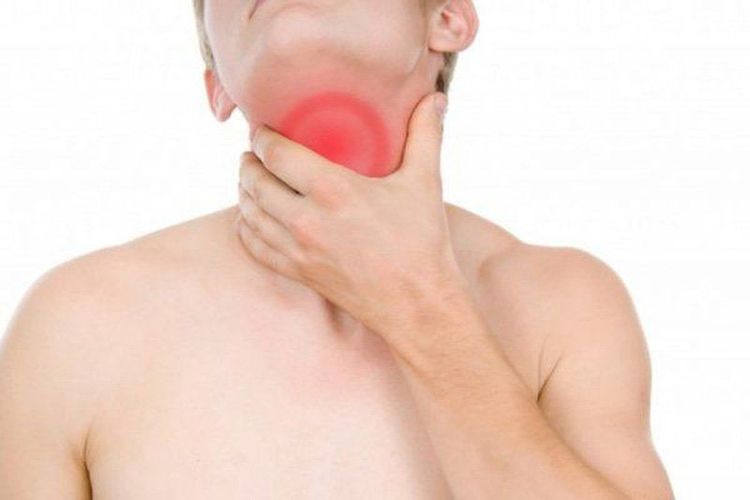
Vì khả năng chứa thức ăn của dạ dày giảm nên sau ăn người bệnh có thể bị trào ngược thức ăn
2. General rules when eating after gastric surgery
2.1 First stage: 1-2 days after surgery In the past, there was a concept that at this stage, patients were not allowed to eat by gastrointestinal tract. It is necessary to wait until the patient has a bowel movement before starting to feed. At this stage, mainly rehydration and electrolytes, providing glucose to ensure the necessary calories for the body.Today, doctors realize that late feeding is not beneficial to the health of the patient. Without early enteral feeding, intestinal cells may become necrotic. The intestinal microbiota can pass through the intestines and enter the bloodstream. In addition, early enteral nutrition also enhances resistance and reduces protein breakdown for patients.
Therefore, during this period, fluids that provide sugar and electrolytes can be given to the patient through an intravenous line. Next, start digestive nourishment by giving the patient very little drink. Should not be given if the patient has severe abdominal distension.
2.2 Next Stage After partial or total gastrectomy, food passes through the stomach more quickly, even directly into the first part of the small intestine. As a result, the first gastric phase of digestion may be reduced or eliminated.
To help digest easier, reduce disorders after gastric bypass surgery, patients should eat slowly, chew thoroughly and prepare food thoroughly. At the same time, patients should divide meals during the day, giving priority to foods with high nutritional value.
Food groups to choose for patients include complex starches, soft vegetables, skimmed milk, low-fat yogurt, lean meat, lean fish, vegetable oil, etc. Should be processed using prolonged heat method. to break the bonds of food, help patients digest and absorb better.
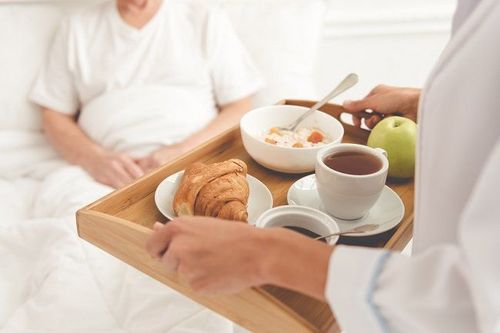
Để giúp tiêu hóa dễ dàng hơn, giảm rối loạn sau phẫu thuật dạ dày, người bệnh nên ăn chậm, nhai kỹ và chế biến kỹ các món ăn
Protein can be up to 120 - 150 / day, calories can be up to 2500 - 3000kcal / day. The patient's diet should be divided into many meals a day, in which should use a lot of eggs, milk and legumes to increase protein supply for the body. At the same time, patients should eat fruits to enhance vitamins of group B and group C.
MORE: Diet and exercise in patients after gastric bypass surgery
3. What to eat after gastric bypass surgery?
What to eat after gastric bypass surgery? Some food groups are recommended for patients after gastric bypass surgery, including:Protein-rich foods: Help the patient's health recover quickly. At the same time, foods rich in protein also help slow down the digestive process and prevent diarrhea. In addition, this food group also provides protein, preventing muscle breakdown. Therefore, the patient should eat foods such as meat, fish, eggs, poultry, cheese, butter,...; Grains: Patients after total gastrectomy should eat low-fiber cereals. People who are sensitive to fiber often experience discomfort and may experience diarrhea if too much is consumed. Should apply a low-fiber diet as recommended by the doctor to relax the digestive tract, avoiding the formation of fibrous tufts at the anastomosis; Fruits and vegetables: Most fruits and vegetables are good for patients after gastric bypass surgery. However, with green vegetables, they should be eaten cooked, with fruits, they need to be peeled and seeded before eating. Among the fruits, banana and watermelon are the 2 best fruits for the patient; Milk: An important, essential food in the diet of most people with digestive diseases. It helps to provide many essential nutrients to the body when the patient cannot or should not eat other foods. For people after gastric bypass surgery, can choose completely skimmed milk or low-fat milk in their daily diet.
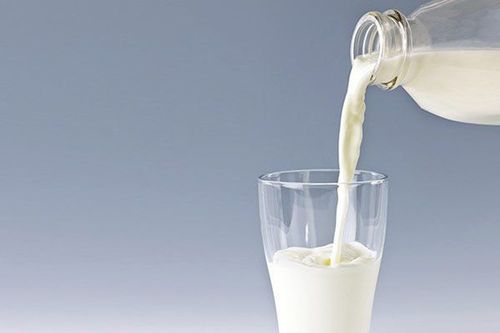
Sữa là thực phẩm quan trọng, thiết yếu trong chế độ ăn của hầu hết người mắc bệnh tiêu hóa
4. Some notes when setting up the patient's diet after gastric bypass surgery
After gastric bypass surgery, patients should eat 6-8 main meals and snacks per day, eat slowly, chew thoroughly and stop eating when feeling full. Patients should not force themselves to eat the entire meal. In addition, the patient should note when setting the following diet:The patient should add vitamins B1, B12 and iron tablets to improve health and prevent anemia after surgery; Should diversify foods to fully supplement the body's nutrients and increase appetite; Should maintain a dry diet: Do not drink water and beverages in the same meal, do not drink soup in the same meal, should drink water 30 - 60 minutes after eating and do not use foods high in sugar; Limit fermented foods (pickles, salted onions), hot spicy spices, sour fruits, hard foods and stimulants; Avoid foods with a lot of caffeine, alcohol; Do not lie down immediately after eating but should walk gently or sit for about 30 minutes after eating. Gastric surgery is a common treatment for many diseases of the stomach. After surgery, patients need to pay attention to build a scientific and healthy diet to quickly recover health and avoid possible complications.
To ensure safety and monitor disease status after gastric bypass surgery, patients should perform periodic health check-ups or follow-up appointments as prescribed by the doctor. At Vinmec International General Hospital, there are now a full range of tests and clinical examinations to check the health status and monitor the time after gastric bypass surgery. Therefore, if the patient notices abnormal signs, they can go to Vinmec International General Hospital for a general health examination, monitor the incision, recovery and timely treatment in some necessary cases. set.
Please dial HOTLINE for more information or register for an appointment HERE. Download MyVinmec app to make appointments faster and to manage your bookings easily.




